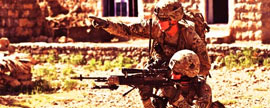The following information is an extract from the book “Military Writing.”
Military awards fall into three categories: awards for service, achievement, and valor. An award for service recognizes outstanding work over a period of time, usually during one assignment or a deployment. In contrast, an award for achievement addresses one specific event, for example, selection as the NCO of the Year or Battalion Marksmanship Champion. Awards for valor or bravery under exceptionally dangerous circumstances generally involve service in combat. The exception to this is the Soldiers Medal, which recognizes courage in a non-combat situation, for example, jumping off a highway bridge to save someone from drowning.
Most award recommendations you write will be for service, as in change of station, reassignment, completion of a deployment, or retirement. In this regard, they are similar to a positive performance evaluation. While the individual may not have been the very best supply technician you have ever supervised, he undoubtedly did some things right. It is these achievements that form the core of an award recommendation for service.
Award recommendations are done on a form which consists of four basic parts.
Individual Being Recommended – Name, rank, organization, their previous awards, the recommended award, reason for the award (service, achievement, or valor), beginning and ending dates in the case of service awards or date of the event being recognized, and the proposed presentation date.
Recommender – Name, rank, organization, title or position, and relationship to the person you are recommending for the award. If you are recommending the award, then this is your information. However, if you are writing the recommendation for someone else, who will sign it as the recommender, use their information.
Justification – Listing of achievements which justify the award. In the case of a service award, these are often identical to what you put in the individual’s performance evaluation.
Proposed Citation – Recommended wording to appear on the award certificate and be read aloud at the presentation ceremony.
The first two parts are fairly simple. It is important, however, to insure that you have all the administrative information correct, because this is an area that can easily get an award recommendation returned for correction. Particularly if you are up against a short suspense for when the award must be presented, this is a headache you can avoid. Also, recommend the appropriate award. Although the regulation is very specific in stating that awards are not restricted to particular rank or pay grade, in reality you will never see the Legion of Merit awarded to a private, nor the Army Achievement Medal to a colonel. Find out what level award is customarily presented to individuals of this rank and accomplishment in your organization. While there are exceptions, in general don’t waste your time trying to justify an award that will not be approved because of the individual’s rank.
Justification
Use the inverted pyramid approach in writing the achievement statements to justify the award you are recommending. That is, lead with the strongest point. Your award recommendation will be read by the awards board and/or the approving authority, and you want to get their attention quickly. Make it easy for them to say yes based on your first few statements. Do not make the mistake of listing achievements in the order in which they occurred, which can dilute the strength of your recommendation. If you can quantify achievements, do so.
For More Information on this subject see the following resource(s):
Please Read! Help Us Help Others!
If you think this site is useful please tell your peers, subordinates, and superiors. Also we are always looking for examples, classes, briefings, SOPs, templates and other information we can share for free in the ASKTOP.net Armsroom. Please help us help others by sending your ARMS ROOM stuff to: mark.gerecht@mentorinc.us












